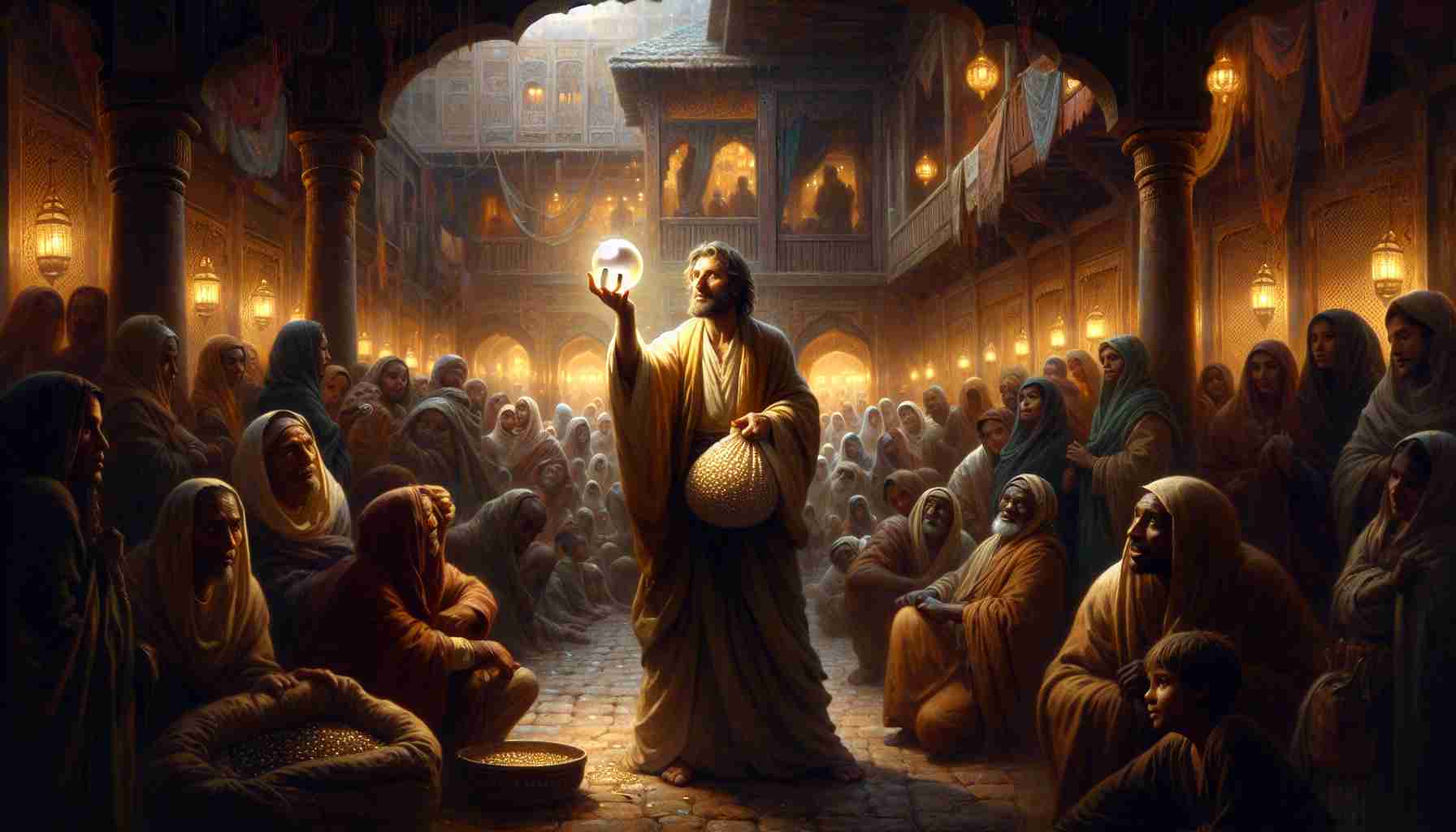

The sun pressed down like the tax collectors of Rome—unrelenting, indifferent. Yitzhak pulled his tunic tighter against the dust kicked up by the morning merchants flooding the streets of Capernaum. He should have been proud. After years of bargaining in the coastal markets and dodging crooked brokers, he'd finally amassed enough wealth to buy freedom from his past. Yet his chest felt hollow, like the crates he used to smuggle silk past the guards.
He passed the outer gates of the marketplace and turned down a quieter alley, lined with older stalls and poorer vendors. That’s where he saw it—a small booth swathed in shadows. An old merchant, bent and silent, revealed a single object from within a wrapped cloth: a pearl so pure, so radiant, it pulled breath from Yitzhak’s lungs.
“How much?” his voice cracked.
The man didn’t answer. He only looked at him with eyes dark and still as the night sea, then closed the cloth again.
“I can pay,” Yitzhak insisted. “Silver. Gold. Furs. Name your price.”
Still, no answer. Only silence—and a soul-deep sense that this pearl was not for trading.
That night, Yitzhak didn’t sleep. He stared at the beams of his house, heavy beneath the roof he bought with compromise. He had everything. Yet the pearl haunted him—a thing of unexpected mercy that exposed how poor he truly was.
By morning, he’d sold it all.
The rugs, the rings, the crates of dyestuff. His house. Even the name he’d made for himself. Word spread fast: the fool merchant who gave up a fortune for a dream.
He returned to the shaded stall only to find it empty—no pearl, no cloth, no merchant.
Shame clamped around his throat. He sank to his knees in the dust outside the temple gate, unable to lift his eyes. What had he done?
A shadow fell across him.
He looked up.
A man stood there in plain robes, his eyes deep with sorrow—and something else. Radiance. Not from status or wealth, but from something buried even deeper. Compassion.
“Why do you weep?” the man asked softly.
Yitzhak almost laughed. “I gave up everything. I have nothing left.”
The man crouched beside him. “Then you are ready.”
“For what?”
Without answer, the man extended his hand. In it rested the pearl.
Not the one from the market—but the same sense of purity. Of truth.
Tears rushed to Yitzhak’s eyes. “But how…?”
“I do not sell what is freely given,” the man said. “But only those who give all may hold it.”
No title passed between them. No transaction. Just Yitzhak’s trembling hands accepting grace he could never earn.
When he stood, the dust still clung to his knees, and the market still buzzed nearby. But the weight in his chest was gone.
He walked away with empty pockets and a heart so full he feared it would burst.
And for the first time, he didn’t look back.
The sun pressed down like the tax collectors of Rome—unrelenting, indifferent. Yitzhak pulled his tunic tighter against the dust kicked up by the morning merchants flooding the streets of Capernaum. He should have been proud. After years of bargaining in the coastal markets and dodging crooked brokers, he'd finally amassed enough wealth to buy freedom from his past. Yet his chest felt hollow, like the crates he used to smuggle silk past the guards.
He passed the outer gates of the marketplace and turned down a quieter alley, lined with older stalls and poorer vendors. That’s where he saw it—a small booth swathed in shadows. An old merchant, bent and silent, revealed a single object from within a wrapped cloth: a pearl so pure, so radiant, it pulled breath from Yitzhak’s lungs.
“How much?” his voice cracked.
The man didn’t answer. He only looked at him with eyes dark and still as the night sea, then closed the cloth again.
“I can pay,” Yitzhak insisted. “Silver. Gold. Furs. Name your price.”
Still, no answer. Only silence—and a soul-deep sense that this pearl was not for trading.
That night, Yitzhak didn’t sleep. He stared at the beams of his house, heavy beneath the roof he bought with compromise. He had everything. Yet the pearl haunted him—a thing of unexpected mercy that exposed how poor he truly was.
By morning, he’d sold it all.
The rugs, the rings, the crates of dyestuff. His house. Even the name he’d made for himself. Word spread fast: the fool merchant who gave up a fortune for a dream.
He returned to the shaded stall only to find it empty—no pearl, no cloth, no merchant.
Shame clamped around his throat. He sank to his knees in the dust outside the temple gate, unable to lift his eyes. What had he done?
A shadow fell across him.
He looked up.
A man stood there in plain robes, his eyes deep with sorrow—and something else. Radiance. Not from status or wealth, but from something buried even deeper. Compassion.
“Why do you weep?” the man asked softly.
Yitzhak almost laughed. “I gave up everything. I have nothing left.”
The man crouched beside him. “Then you are ready.”
“For what?”
Without answer, the man extended his hand. In it rested the pearl.
Not the one from the market—but the same sense of purity. Of truth.
Tears rushed to Yitzhak’s eyes. “But how…?”
“I do not sell what is freely given,” the man said. “But only those who give all may hold it.”
No title passed between them. No transaction. Just Yitzhak’s trembling hands accepting grace he could never earn.
When he stood, the dust still clung to his knees, and the market still buzzed nearby. But the weight in his chest was gone.
He walked away with empty pockets and a heart so full he feared it would burst.
And for the first time, he didn’t look back.